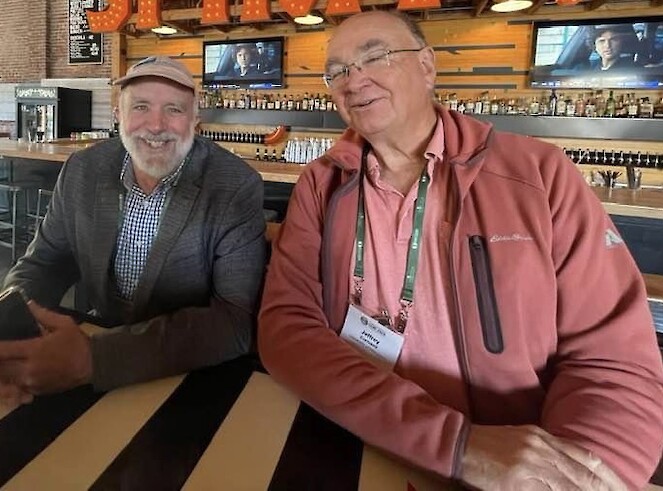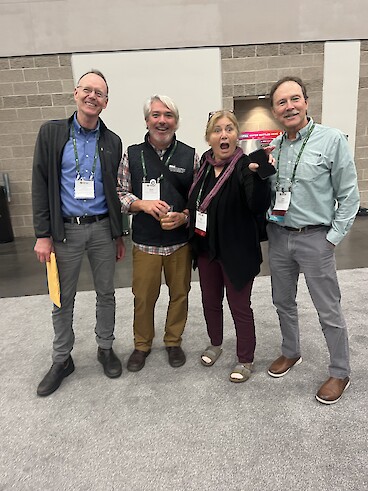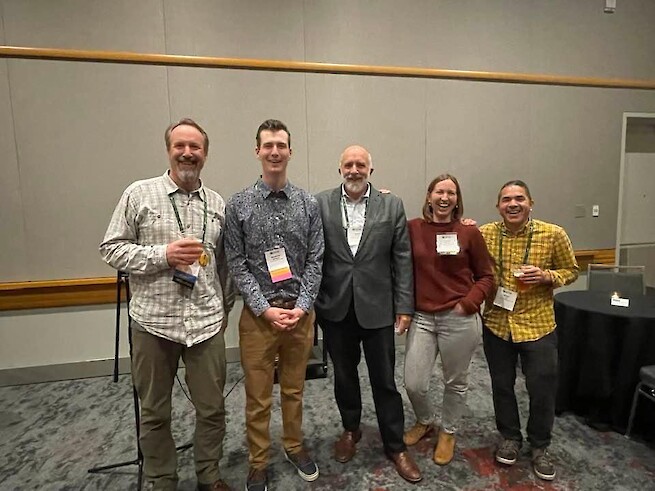UMCES reception at the Coastal Estuarine Research Federation conference
Bill Dennison ·We held a reception for current and former UMCES faculty, staff and students at the biennial Coastal and Estuarine Federation (CERF 2023) conference in Portland, OR. In addition, UMCES sponsored a booth in the coffee break and poster session area. The evening event on November 13th was a chance to gather UMCES folks together, as the meeting had ten concurrent sessions and you could miss seeing each other as you raced from session to session. I made the following introductory remarks at the gathering.
Good evening; Thanks for coming—my name is Bill Dennison and since September I’ve been serving as the Interim President of UMCES while an active search is on-going. I have been attending Coastal and Estuarine Federation conferences for the past 40 years, and one of the things that keeps me coming back is the opportunity to reconnect with friends and colleagues. I am so glad that UMCES has been holding these mixers to facilitate these connections. Thanks to Dave Nemazie for making this happen.

UMCES was key to Inventing estuarine science, including the founding of Estuarine Research Federation now CERF. UMCES pioneered eutrophication science, and then set up a globally eminent modeling, monitoring and management program 40 years ago — the Chesapeake Bay Program.
And now I am excited to announce the next leap forward, with the formation of the Chesapeake Global Collaboratory. This exciting initiative will use innovative data analysis tools like artificial intelligence and machine learning, develop a more diverse consortium of problem solvers and employ novel approaches to co-produce solutions to the most vexing socio-environmental issues facing society.

In Chesapeake Bay, we have made progress on nutrient reductions with declining nutrient loads, catalyzing the resurgence of submerged aquatic vegetation, and the return of dolphins to the Bay—all of which have been effectively documented by UMCES researchers. This progress is not fast enough — we are sure to miss our 2025 targets, but we are indeed making progress. The problem is that it had taken 40 years to make this progress and due to climate change, biodiversity loss and developing sustainable food systems—we simply do not have the luxury of another 4 decades. We urgently need to accelerate the pace of our environmental research and relevant management actions. This is what stimulated us to create the Chesapeake Global Collaboratory.
We recently celebrated the 60th anniversary of the Appalachian Lab and this year, we are celebrating 50 years since the formation of our Horn Point Laboratory. Another big date approaching is 2025, when we will celebrate the formation of our Chesapeake Biological Laboratory in 1925. We plan to make our centenary a big deal, and I would like to introduce Lois Colaprete, our VP for Development, who is going to ensure that we use the centenary to help us fund the Collaboratory and propel UMCES in to the next hundred years. So this party tonight is only a prequel for when we gather at the next CERF conference, celebrating our centenary. We plan to hold a series of events in 2025 and we really want you all to be involved in helping us celebrate this important milestone.

It is an exciting time at UMCES. We are hiring at multiple levels. There are 25 job ads on our website. We have a ongoing search for faculty at AL with faculty job ads being planned for CBL and HPL. We also have some leadership positions available.
With only 6 UMCES Presidents in nearly a hundred years, and lab directors who have had equally long tenures, a lot of transitions are taking place. Mike Roman retired after 2 decades of leading Horn Point and Mike Sieracki stepped in. Tom Miller recently stepped down from being Director of the Chesapeake Biological Lab after a decade of leadership and Carys Mitchelmore is serving as interim Director. Russell Hill has announced that he will step down as Director of the Institute of Marine Environmental Technology in 2024. I have stepped aside from running the Integration and Application Network and Heath Kelsey has stepped into the role as Director. Dave Nelson is now the Director of the Appalachian Laboratory. Fortunately for us, Fredricka Moser is hanging in there as Maryland Sea Grant Director. At each of our UMCES units, we recently recruited faculty to serve as Associate Directors of Research.
This year, I have the pleasure and distinct honor of announcing the Michael Kemp Award. This new award is to commemorate one of the preeminent estuarine scientists who spent his career at UMCES. Michael and his long-time friend and collaborator, Walter Boynton, received CERF’s prestigious Odum Award for their groundbreaking synthetic work on Chesapeake Bay. But what made Michael special in my view was not just his prodigious intellect but his deep soul. Michael was the singular reason I joined UMCES in the first place.
The Michael Kemp Award funds a graduate student to attend the CERF conference, and this inaugural recipient is here tonight: Ben Malmgren. Ben is researching wetland condition using drones and field sampling with Professors Lori Staver and Cindy Palinkas. Please join me congratulating Ben.

Ben Malmgren, the inaugural Mike Kemp Award recipient, (second from left), flanked by former Mike Kemp graduate students, Drs. Eric Smith (far left), Cassie Gurbisz (second from right) and Jeremy Testa (far right), and UMCES Interim President Bill Dennison (center) who originally came to Horn Point Laboratory because of Mike Kemp. Photo credit; Judy O'Niel
My final task tonight is to invite our emerging scientists to go up and talk to senior scientists and for our senior scientists to engage with the next generation. So please raise your hand if you are a graduate student – keep those hands raised…if this is your first CERF meeting please raise your hand. Thank you for choosing coastal and estuarine sciences as part of your career path – we all know how important it is to treasure these iconic environments. And to the graduate students here tonight, if you are lucky, you may find yourself in the future in a similar place where I am — enjoying the company of a steadfast friend of four and half decades. I am talking about my friend Jeff Cornwell. So remember that the people we work with now will not only impact our lives now but also into the future. Please enjoy the food and drink but mostly enjoy one another.
About the author
Bill Dennison

Dr. Bill Dennison is a Professor of Marine Science and Vice President for Science Application at the University of Maryland Center for Environmental Science.